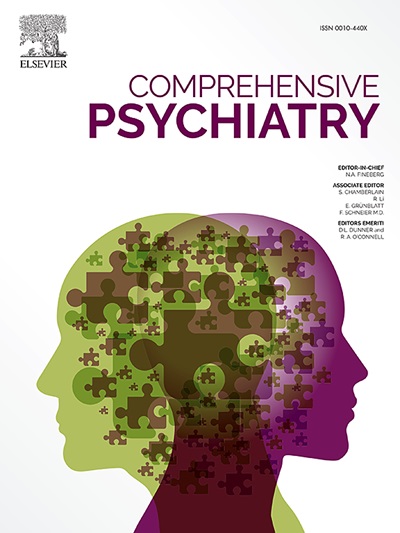人格组织与焦虑症状:完美主义的中介作用研究
IF 4.2
2区 医学
Q1 PSYCHIATRY
引用次数: 0
摘要
背景与目的人格功能在心理健康和精神障碍的评估中具有越来越重要的意义。奥托·克恩伯格(Otto Kernberg)的人格组织模型是一种广泛应用的、有理论基础的方法,它根据心理和人际功能对人格障碍的严重程度进行分类。在此基础上,编制了人格组织量表(IPO)及其16项简短版本。本研究旨在(1)检验16项短版IPO的因素结构;(2)探讨完美主义在人格组织与焦虑关系中的中介作用。方法4340例,平均年龄37.7岁;50.7%的女性)在采用16项IPO的基础上进行焦虑(简短症状量表)和完美主义(多维完美主义量表)的评估。结果具有3个具体因子的双因子模型对IPO-16的拟合水平最优。只有一般人格功能障碍因素具有高水平的内在信度。自我导向和社会规定型完美主义在一般人格功能障碍因素与焦虑症状之间起中介作用。较高的GPD水平预示着更高的自我导向和社会规定的完美主义发生率,这导致了更严重的焦虑症状。结论在研究和临床应用中,IPO-16可有效地评价人格功能障碍的一般水平。本文章由计算机程序翻译,如有差异,请以英文原文为准。
Personality organization and anxiety symptoms: Investigating the mediation of perfectionism
Background and aims
Personality functioning has increasing significance in the assessment of mental health and mental disorders. Otto Kernberg's model of personality organization is an extensively applied, theoretically grounded approach to categorizing the severity of personality impairment based on intrapsychic and interpersonal functioning. The Inventory of Personality Organization (IPO) self-report rating scale and its 16-item short version were developed to assess personality organization based on this model. This study aimed (i) to examine the factor structure of the short, 16-item version of the IPO, and (ii) to investigate the mediating effect of perfectionism on the relationship between personality organization and anxiety.
Methods
4340 individuals (mean age 37.7 years; 50.7 % females) were assessed for anxiety (Brief Symptom Inventory) and perfectionism (Multidimensional Perfectionism Scale) besides applying the 16-item IPO.
Results
A bifactor model with three specific factors showed the most optimal levels of model fit for the IPO-16. Only the general personality dysfunction factor was characterized by high levels of internal reliability. Self-oriented and socially prescribed perfectionism mediated the relationship between the general personality dysfunction factor and anxiety symptoms. Higher levels of GPD predicted higher rates of self-oriented and socially prescribed perfectionism, which contributed to more severe symptoms of anxiety.
Conclusion
The IPO-16 can be usefully applied to assess a general level of personality dysfunction both in research and in clinical use.
求助全文
通过发布文献求助,成功后即可免费获取论文全文。
去求助
来源期刊

Comprehensive psychiatry
医学-精神病学
CiteScore
12.50
自引率
1.40%
发文量
64
审稿时长
29 days
期刊介绍:
"Comprehensive Psychiatry" is an open access, peer-reviewed journal dedicated to the field of psychiatry and mental health. Its primary mission is to share the latest advancements in knowledge to enhance patient care and deepen the understanding of mental illnesses. The journal is supported by a diverse team of international editors and peer reviewers, ensuring the publication of high-quality research with a strong focus on clinical relevance and the implications for psychopathology.
"Comprehensive Psychiatry" encourages authors to present their research in an accessible manner, facilitating engagement with clinicians, policymakers, and the broader public. By embracing an open access policy, the journal aims to maximize the global impact of its content, making it readily available to a wide audience and fostering scientific collaboration and public awareness beyond the traditional academic community. This approach is designed to promote a more inclusive and informed dialogue on mental health, contributing to the overall progress in the field.
 求助内容:
求助内容: 应助结果提醒方式:
应助结果提醒方式:


